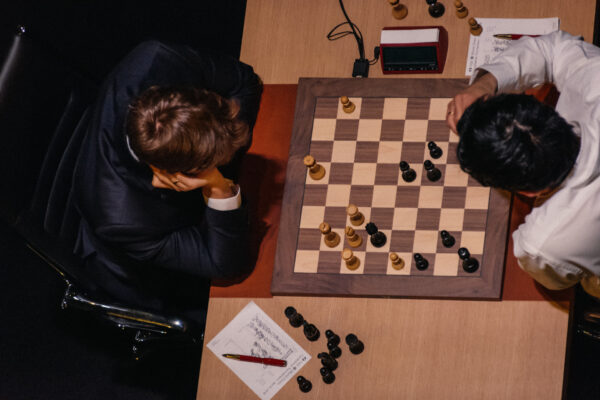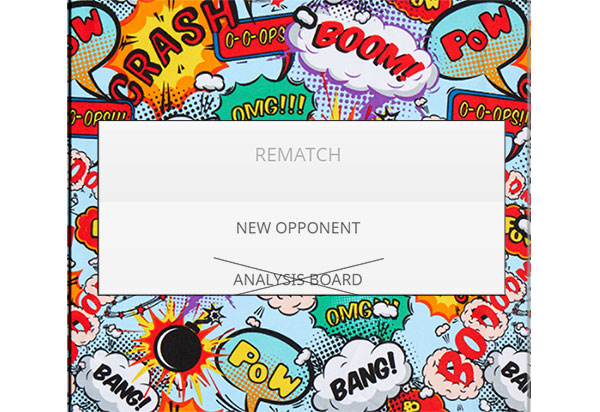Keep your attention span nice and short
Every day, self-proclaimed experts try to steal our short attention spans. The so-called deficit is basically too much potential. Ten valuable tips to keep you safe.
Envious people call this attention deficit. We don’t call it that. We love it when our attention spans are so short. We react quickly, we play quickly and we act quickly. Envious want that too or try to “cure” us. We just know better than others what we want and what we don’t want. Worry no more: How to keep your attention span nice and short.
Deutsche Version1. Limit the time control to a minimum
Fast play is good. This is the only way to train our decisiveness. Free yourself from the eternal strolling around the board. Chess needs action! If possible, avoid tournament games, because they don’t help. Pure waste of time. Just consider how many bullet games you could be playing along the way. If things go wrong: no problem. “New Game”, the thing is already over and everything is forgotten.
2. Avoid Analysis
You can’t change the result after all. Especially after a defeat just go for the rematch button! As soon as possible and immediately, without delay. You know the old cowboy riding wisdom. If you have fallen off your horse, you should get back up immediately.
But if the curiosity is too great: Use only automatic analysis functions. Never, we have to emphasize it at this point: NEVER analyze your games on a chessboard without using the safe and reliable help of the computer. Much too imprecise. Use only automatic analysis tools that present the result immediately or after a few seconds. And if you are already going through step by step manually, make sure to let the engine run along. Once the bug is found, don’t bother with the old stuff anymore. Had, had bicycle chain. Next!
3. Always play the same
This reduces the risk of temptation to master too many positions. It is better to use the London system a hundred times a day than to constantly play these supposedly so interesting positions that you have to learn with great effort and possibly with books.
4. Play for Traps
Play the Englund Gambit or the Fajarowicz Gambit. Confuse your opponents and lure them into ambushes. It’s true, the so-called rebuttals are especially known to professional players, but usually the opponents only have one pawn more or a bearable lead in development. You can handle that. We have the initiative and that is what we want.
5. Follow your Impulses!
Do you want to attack but don’t know how? Many trainers advise learning to attack systematically. All nonsense! Just throw everything forward. Your opponent played g3 and wants to castle? Push the h-pawn forward and then BAM! Get the King! Slam something into the position – you’ll see, White is done quickly. Chaos is good.
6. Avoid Books
Books and, above all, these tedious, tangled, non-practical calculation exercises, players like us get our training from YouTube videos. Lean back and enjoy the lectures by acclaimed masters. They are entertaining and only envious people call it sprinkling. As with “The Matrix” we plug ourselves in and load our programs. Skeptics may say that our fast brains are not stimulated in this way and that what we have learned this way is badly stored, but these nose-wise studies are worthless, because we know that none of this matters in bullet games. That’s why we don’t need any exercises to go deep into calculation. Has anyone ever had the Réti maneuver in the game?
This is even better than @agadmator and @pepeich_cuenca together. 😂 pic.twitter.com/Klx02baX4j
— David Llada ♞ (@davidllada) November 21, 2020
7. Let your feelings lead you
In bullet, we don’t need that pseudo-academic stuff. Forget the myth of systematic learning! We need practice, not a degree. At some point we will find out how to play these elementary openings, middle games and endgames. Six thousand to ten thousand bullet games might suffice, then the knowledge about an opening grows by itself. We let our instincts lead us to our pray and want to preserve our personality. The whole academic blah is only for second-rate people who don’t have ideas of their own. We shock our opponents with our will to dominate. That’s half the battle.
8. Secure your own space
Gambling is good and creates oases of well-being. Basically do your errands, bathroom routines and official obligations AFTER extended bullet sessions. We need our endurance. We will take care of the other things afterwards. And if there is something that cannot be postponed: Enjoy the thrill when you try out how many bullet games you can still manage before you really have to pick up your child from school. Show your roommates your priorities clearly! Nobody shall disturb you while you are playing at maximum performance. After all, it is also about valuable rating points on the online servers, isn’t it? Do you disturb your children while they are playing? Bingo. Equal rights for everyone!
9. Avoid Real Opponents
Play with weaker opponents rather than stronger ones. This is important for your ego. If you prefer to play on the Internet than with real opponents. Avoid chess clubs. The internet protects us from unloved closeness to the enemy. We want his points, not his company. The annoying talking is gone, the constant discussion, the distraction. Everything that annoys you. In the chess club we also meet too many players who learn secretly. We avoid nerds like these. We also don’t want to be tempted to waste our time on theory.
10. Do not calculate. Act!
“There is no spoon,” says “The Matrix”. See? Go the easy way.




